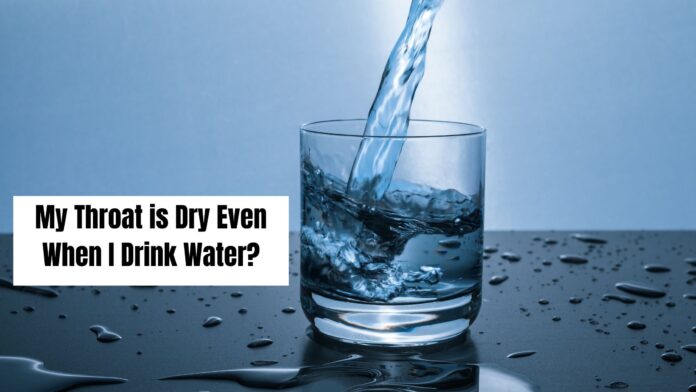A dry throat is a common symptom that could result from various factors. Often, it happens due to dehydration or dry environmental situations. Nevertheless, if you’re properly hydrating and your throat remains dry, it might suggest an underlying medical problem. In this article, we will explore Why Is My Throat Is Dry Even When I Drink Water.
Common Causes of a Dry Throat
Dehydration: Not drinking enough water can reduce saliva production, leading to a dry, dry throat. Saliva helps lubricate the throat and mouth.
Dry air: Environmental factors can irritate the throat and cause dryness, especially in dry winter conditions or low humidity areas.
Allergies: Allergies release histamines that can irritate the throat and nose, and other symptoms include dryness.
Medications: Some medications, such as antidepressants, anticonvulsants and diuretics, can cause dry throat as a side effect.
Nasal breathing: Nasal breathing is often associated with allergies, stuffy noses, or specific medical conditions, and can cause dry throat, especially at night
Acid reflux: Acid reflux occurs when stomach acid backs up into the digestive tract, causing irritation, dryness and burning in the throat
Medical conditions: Underlying medical conditions such as diabetes, sleep apnea, and Sjögren’s syndrome can also cause dry throat.
Home Remedies for a Dry Throat
If you’re experiencing a dry throat, you can take several steps at home to alleviate the soreness:
- Stay Hydrated
Consume plenty of fluids, particularly water, to hold throat moisture. Clear broth, juice, or tea can also be beneficial.
- Use a Humidifier
Employing a humidifier in your house can introduce moisture into the air, which aids in relieving dry throat signs and symptoms.
- Gargle with Salt Water
Gargling with salt water can soothe a sore throat and assist get rid of bacteria. To prepare salt water, blend 1/2 teaspoon of salt in 8 oz. Of warm water. Gargle for 30 seconds, repeating several times an afternoon.
- Suck on Lozenges or Hard Candy
Sucking on lozenges or hard candy can assist keep throat moisture and alleviate dryness.
- Avoid Caffeine and Alcohol
Steer clean of caffeine and alcohol as they’ve dehydrating consequences and can exacerbate a dry throat.
RELATED: Pfizer bivalent booster side effects
Treatment for a Dry Throat
Treatment for a dry throat will vary depending on the underlying cause. If you have a medical condition that is causing your dry throat, your doctor will treat that condition first.
If your dry throat is caused by dehydration or dry air, you may need to drink more fluids and use a humidifier. If you have allergies, your doctor may prescribe allergy medications. If you are taking any medications that are causing dry throat as a side effect, your doctor may be able to switch you to a different medication.
Prevention
There are a few things you can do to help prevent a dry throat:
- Drink plenty of fluids throughout the day.
- Use a humidifier in your home, especially in the winter.
- Avoid caffeine and alcohol.
- Treat allergies and acid reflux promptly.
- See a doctor if you have mouth breathing.
When to See a Doctor
If your dry throat is severe or does not improve with home remedies, see a doctor. They can rule out any underlying medical conditions and recommend appropriate treatment.
If you want to get knowledge about Why Is My Throat Is Dry Even When I Drink Water through video, then watch the complete video given below:-
I hope you liked our article on my throat is dry even when I drink water, if you have any comments or suggestions do share them in the comments box below.
Related Faq Of Dry Throat
Q1: What is a dry throat?
Ans: Dry throat: A feeling of dryness or itching in the throat. It can be caused by dehydration, hot air, allergies, medications, mouth breathing, acid reflux and certain medical conditions.
Q2: What are the symptoms of dry throat?
Ans: The most common symptoms of dry throat are dryness or tenderness in the throat. Other symptoms include:
- It’s hard to swallow
- The sound of a noise
- Ticklish throat
- cough
- Pain in the neck
Q3: What causes dry throat?
Ans: The water is not clean
The air is dry
Allergic reactions
Pharmaceutical products
Breathing in the mouth
Acid reflux
Medical conditions such as diabetes, sleep apnea, and Sjögren’s syndrome
Q4: How can I prevent a dry throat?
Ans: Drink plenty of water throughout the day.
Use a humidifier in your home, especially in the winter.
Avoid caffeine and alcohol.
Treat constipation and acid reflux immediately.
If you have breath in your mouth, see a doctor.





